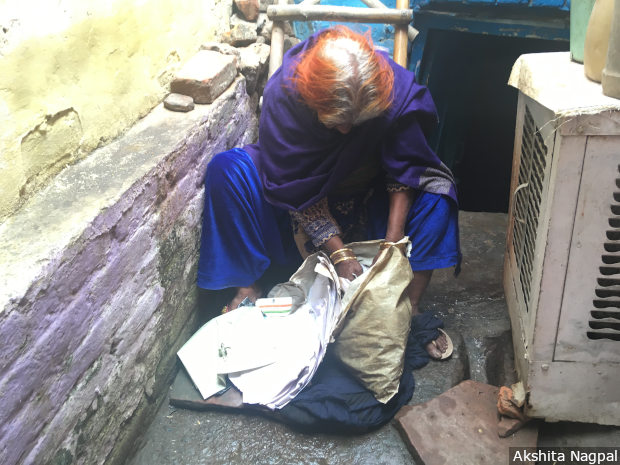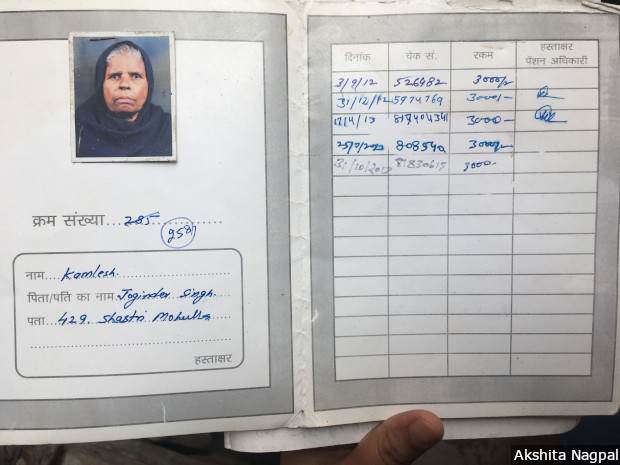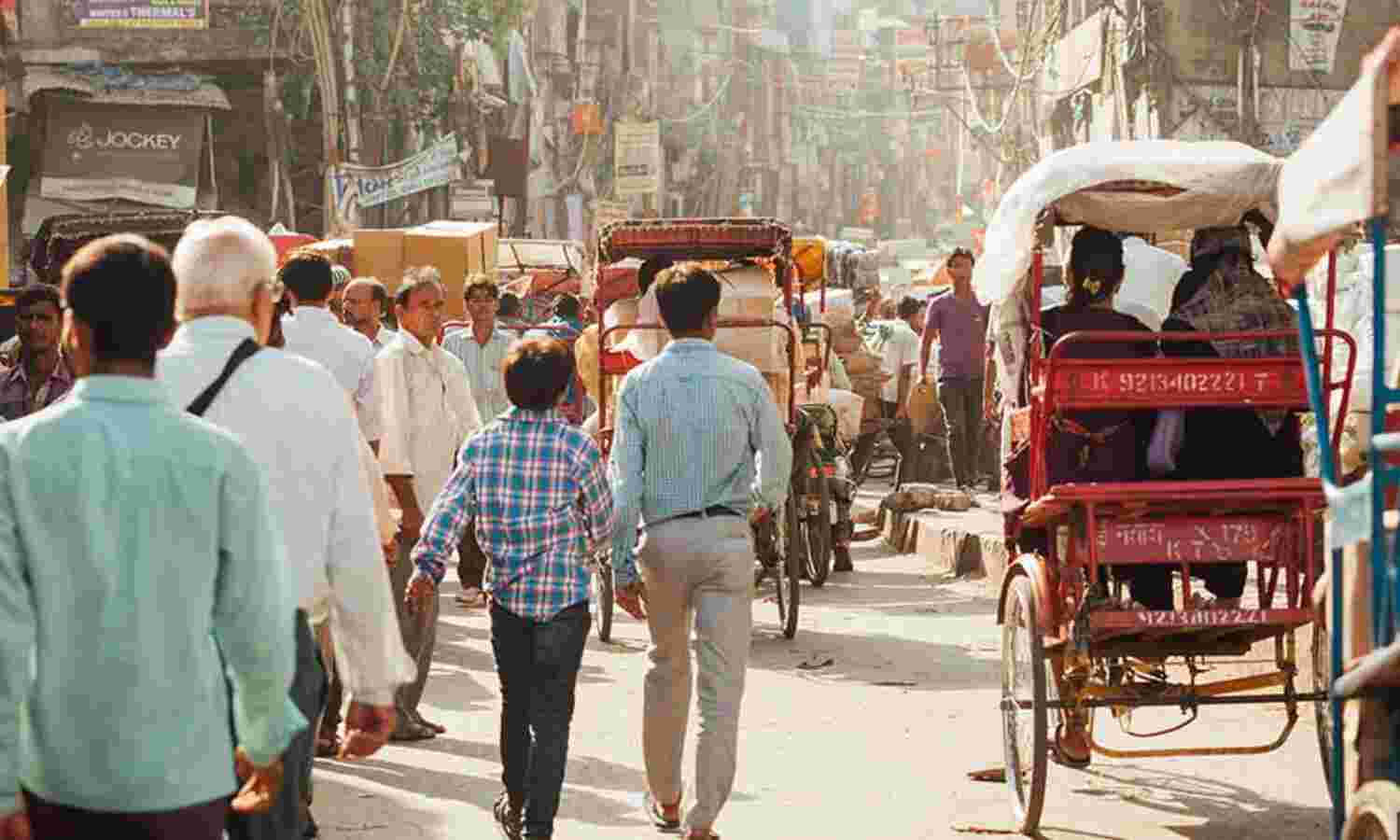Why Kararujjama, 73, Still Pulls A Rickshaw On Delhi's Streets
New Delhi: Kararujjama’s hard life could be easier if he got a monthly pension of Rs 1,000 paid by the three municipal corporations of India's capital to its poor senior citizens. At 73, he makes a living driving a cycle-rickshaw on the streets of north Delhi’s Kingsway Camp area.
“Kab se pension nahin aa raha hai (I can’t remember how long I haven’t been paid a pension),” said Kararujjama, who migrated here from Bihar’s Supaul district decades ago in search of a livelihood.
The pension could have also allowed Ram Pyari, a frail widow who lives in a hut in north Delhi’s GTB Nagar area, to be independent of her two daughters, both domestic workers. On record, Ram Pyari is 64, but she is clearly a lot older--the year of her birth has been wrongly entered in her Aadhaar card, she said--and age restricts her movement.
The pension was not much, but it kept Ram Pyari from starving. “Koi sona-chandi to nahin banaya, sirf pet aur roti ka kaam chalta tha (the pension wasn’t enough to buy gold or silver but it took care of the hunger),” she said.
Kararujjama and Ram Pyari are among nearly 200,000 impoverished senior citizens of Delhi who lost their pension in 2013, a year after Delhi’s municipal corporation was trifurcated into north, south and east districts. The administrative split had depleted the corporation’s resources, and there were no funds to pay poor elderly citizens, the newly created corporations headed by the Bharatiya Janata Party (BJP) reasoned.
There are currently 1.14 million elderly persons in Delhi. The stipend used to be paid to anyone above 60 years of age with no support or income, and whose annual income from all sources was less than Rs 48,000. These applicants also could not benefit from other government pension schemes, such as the one run by the Delhi state government.
In 2016, in response to a petition, the Delhi High Court had asked the Delhi government to deal with the crisis caused by the corporations’ decision. But only a small number of former corporation beneficiaries, roughly 8-11% as we explain later, are being paid under the Delhi government’s Old Age Assistance scheme.
Why are payments held up?
The problem lies with the political hostilities between the BJP, which heads the corporations, and the Aam Aadmi Party (AAP) that currently heads the Delhi government, said municipal and state government officials who did not wish to be named because they were not authorised to talk to the media.
Our investigations also found that the process of verifying the ex-corporation beneficiaries is caught in a web of official apathy and red tape.
The Delhi government’s pension amounts are among the highest in India. In 2017, the amount was revised to Rs 2,000 per month to those eligible and between 60-69 years of age, and Rs 2,500 to those above 70 (an additional Rs 500 is paid per month to beneficiaries from scheduled castes and scheduled tribes). Delhi also has a pension programme for widows and the disabled.
The national average for pensions to destitute senior citizens is around Rs 889, according to a 2018 report of Helpage India, a nonprofit organisation. Like Delhi, Kerala, Goa, Puducherry and the Andaman and Nicobar Islands also pay Rs 2,000 as pension.
To this payment made from state government funds, the central government contributes Rs 200 per beneficiary under the Indira Gandhi National Old Age Pension Scheme. This pension applies to destitute beneficiaries from below-poverty-line households and above 60 years and has not been revised since 2006-07, though the Centre did raise the amount for those above 80 years to Rs 500.
These pensions are not adequate for survival, forcing many elderly people to continue working as long as they can, IndiaSpend reported in April 2017.
Old-age pensions are seen as a senior citizen’s right, a payback for economic contributions made through their working lives, to be paid at a time when earning capacity has declined due to age or poor health, according to experts.
They honour unpaid contribution of senior citizens to families and to society, roles that are even truer among Indian joint families and close-knit rural communities, and help to reduce the economic dependence of the elderly on their families.
In India, where the share of the elderly in the population is increasing at a faster rate than before, as the 2017 India Ageing Report by the United Nations Population Fund showed, experts consider government support essential.
Currently, the elderly (aged 60+) comprise 6.8% of Delhi’s population and 8.6% of India’s, according to a 2016 ministry of statistics report. India’s share of population over the age of 60 is projected to more than double between 2015 and 2050--from 8% to 19%--the report said.
By the end of the century, the elderly will constitute nearly 34% of the country’s population, the report added. This makes it important for support programmes, such as the one run by the Delhi government, to ensure that senior citizens are allowed to retire in comfort and dignity.

Kamlesh looking for her pension card outside her house in Delhi’s Shastri Mohalla. Kamlesh’s husband died two decades ago and the Rs 1,000 monthly pension from EDMC was her family’s primary income.
‘My body is not capable of labour’
Senior citizen Kamlesh (who uses only one name) lives with her middle-aged son, who has a general learning disability, in east Delhi’s Shastri Mohalla. The Rs 1,000 monthly pension from the East Delhi Municipal Corporation (EDMC) was the family’s primary income. When Kamlesh’s husband died two decades ago, she started doing domestic work but cannot handle it any longer.
“My body cannot manage the labour,” she said.
Kamlesh stepped out of her darkened home--a few steps below street level--to squint at her pension card: The last entry was on October 31, 2013. This was followed by a payment of Rs 4,999 into her bank account on July 5, 2014, which was not entered in her pension card, she said.
“My electricity connection was suspended for a year because I could not pay the bill after the pension stopped coming,” she told IndiaSpend. The area’s social workers have since pleaded with the authorities to reconnect her power supply.

The last entry in Kamlesh’s pension card was made on October 31, 2013
In December 2014, Ashok Agarwal, an advocate who runs Social Jurist, a civil rights group, along with social activist Sunita Chauhan, stumbled upon Kamlesh’s situation. “I was aghast at the sub-human conditions that the elderly were living in, in the absence of pensions,” he said.
Agarwal filed a writ petition before the Delhi High Court and in April 2015, the court criticised the EDMC for not paying pensions to most of the 30,816 beneficiaries under its Old Age Pension Scheme for 24 months from March 2013. It had also denied pensions to nearly 14,000 widows or disabled persons.
Subsequently, the high court found that between 2013 and 2014, the Delhi municipal corporation’s north and south arms had also stopped paying old-age pensions. About 184,000 beneficiaries--30,816 in EDMC, 72,856 in south DMC and about 80,000 in north DMC – had been deprived of payments, the court found.
Passing the buck
Until 2013, Delhi had three municipal corporations--the New Delhi Municipal Corporation, the Municipal Corporation of Delhi, and the Delhi Cantonment Board. Since the trifurcation of the Delhi municipal corporation in 2013, Delhi has five municipal corporations, of which three--north, east and south--have stopped paying pensions, as we mentioned earlier. At the time, and currently too, all three corporations are held by the BJP. The Delhi government, during this time, has been led by the AAP.
The pensions ended after the trifurcation of the MCD, as we said, executed by the then Congress-led state government. The corporations in their reply to the high court said this trifurcation had led to financial shortfalls. The corporations also claimed that the Delhi government had cut down its budgetary grant to the corporations by 16% from Rs 1,881.3 crore to Rs 1581.1 crore between 2013 and 2015, further reducing its resources.
Despite the cuts, each corporation continued providing perks and allowances to its mayors and high-ranking officials, pointed out an official in the north corporation who did not wish to be named. The Delhi government has, in turn, accused the corporations of financial mismanagement and under-recovery of taxes.
The Delhi government’s share in central taxes has remained the same since 2001-2002, despite a 500% increase in its budget during the same time, as per an India Today report. From the 2019-20 interim budget, Delhi government had reportedly asked for Rs 1,000 crore for local bodies, but no such allocation was made.
In 2016, the high court directed the corporations to provide their lists of pension beneficiaries to the state government within four weeks. These beneficiaries would be absorbed by the state government’s department of social welfare (DSW) in the old age assistance scheme (popularly known as old-age pension) under its financial assistance schemes (FAS).
The corporations did not comply and Social Jurist filed a contempt petition in March 2016. When the lists were finally provided, the DSW termed them unreliable, saying “the information is mostly in casual form”.
The number of poor and elderly citizens the Delhi government can support with a pension was capped at 530,000 in 2016. The earlier limit was 430,000 and the state was already paying 384,585 when the high court ordered the addition of 184,00 ex-corporation beneficiaries. The Delhi government then increased the upper cap by 100,000. The state cannot turn down pension applications from widows and the disabled--their applications have to be processed on a rolling basis and are not subject to any cap.
No more than 8-11% of former beneficiaries being paid
In December 2016, the Delhi High Court laid out the process of pension take-over by the state government: corporations would hold camps in their wards along with the DSW to verify former beneficiaries. This process was to be completed within six months or by June 2017. But the camps were held till as late as September 2018.
“I was frustrated by the pace of the case and decided to drop it,” said Agarwal. The contempt case was closed in April 2018.
By the third quarter of 2017, only 8,454 ex-corporation beneficiaries were being paid by the DSW.
What are the numbers today?
“They might be around 15,000-20,000, but it is an approximate figure,” said Rajeev Saksena, deputy director of FAS, in February 2019.
“Actually, this process is under process,” welfare officer Rahul Dixit interjected. “Until it’s complete, we can’t say anything.”
A figure of 15,000-20,000 accounts for 8-11% of those waiting to be paid.
In March 2019, the DSW was paying 442,838 old-age beneficiaries, compared to 384,585 in 2016, indicating that fewer than 60,000 beneficiaries were added in three years. This figure would also include new and previously never-enrolled pensioners (and adjust for beneficiaries who died).
In this process of verifying and enrolling ex-corporation beneficiaries, a demographic that would have limited mobility and resources was asked to physically appear or be denied the allowance.
Old-age pension applications are not included in the nearly 70 services covered by Delhi’s doorstep delivery services available for a fee of Rs 50. Over the past five months, disability and widow pension applications have also been excluded from doorstep delivery, an operator informed IndiaSpend.
‘Online mein loot machi hai’
On a rainy February 2019 morning, a group of 14 elderly women and men from Sadar assembly constituency, accompanied by social activists and senior citizens Hawa Singh and Murari Lal, complained to Rajendra Pal Gautam, Delhi’s minister for social welfare.
The most common complaint was that none of them were listed on the pension rolls though they had submitted applications in December 2018 to the local MLA, Somdutt Sharma. “New applications are closed because we don’t have the budget,” said Vishal Verma, the minister’s officer on special duty, as they waited at his residence-cum-office in Civil Lines. “Anyway the model code of conduct will start soon, so we’ll open after [general] elections.”
The MLA arrived an hour later. “Old age pension unlimited nahin hai, yeh samajh lo (understand that old-age pension ((quota)) is not unlimited),” he said. Hawa Singh (HS) requested online applications to be opened but the minister (RPG) argued it was not feasible for the staff to filter out bona fide claims given the size of the quota. Here is how the conversation unfolded:
HS: Online karr lijiye (make it online).
RPG: Online mein loot machi hai (There’s a loot online).
HS: Check karo kaun entitled hain kaun nahin (Check who’s entitled and who isn’t).
RPG: Kaun check karega itne, 5.3 lakh ka quota hai. Jo pehle aayega, use milega. Jo baad mein aayega, woh waiting mein jaayega (Who will check 5.3 lakh applications. We’ll work on first-come-first-served basis).
Caught in red tape
When IndiaSpend visited the District Social Welfare Office (DSWO, north) in Gulabi Bagh, one of the verification centres, in March 2019, the staff shortage was evident: There were three data-entry operators and a welfare officer, all on contract. The superintendent’s post was vacant. Indu Sehrawat, the welfare officer, was struggling with poor internet speed.
The application modes have also been changing often: Before 2017, applications were made by hard copy at the office of district social welfare officers; in February-March 2017, the process went online and could be completed via the Delhi government’s e-district portal. The rules changed again for the 2018 November-December cycle: online applications could be made only through an MLA, and each MLA could handle 500.
A December 2018 writ petition filed in the Delhi High Court by Aya Nagar municipal councillor Ved Pal against the stoppage of multi-point online applications has reopened the path for online applications. As of May 2019, no processing of applications was being done because of general elections, Sehrawat told IndiaSpend.
“MLAs pass on information (about processing of applications) and we also relay it through newspapers,” said P Ananda Rao, who is the District Social Welfare Officer at the District Office (north).
Leela Devi, 65, a domestic worker, and her husband Vijay Pal, 60, a cobbler, have no access to this information. Vijay Pal’s health is declining and Leela’s earnings simply cannot cover the mounting health bills anymore; and then there is the Rs 2,000 to be paid for their shanty in north Delhi’s Indira Vikas Colony.
“We never find out when the applications open and whom to approach,” said Leela. For now, the couple are headed to Uttar Pradesh, where they will live with relatives. “If we get our pensions, only then can we return to Delhi,” she added.
Correction: An earlier version of the story had misspelt the name of Kararujjama. We regret the error.
(Nagpal is an independent multimedia journalist based in New Delhi.)
We welcome feedback. Please write to respond@indiaspend.org. We reserve the right to edit responses for language and grammar.




